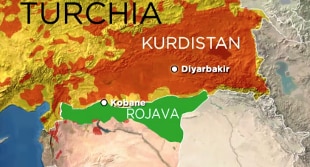- Turkey is about to invade northern Syria. The Kurds: "We will resist at all costs"
- The August 7-Turkey agreement establishing a buffer zone
Share
October 07, 2019That of Syria is a chessboard in continuous transformation. Since the war broke out on March 15, 2011, alliances and disruptions, both military and political, have alternated between the forces on the ground and the powers that support them. In the match, in addition to the Damascus regime led by Bashar Al Assad and the various rebels (Kurds, jihadists, free army), there are the great stakeholders: from Russia to the United States, passing through Turkey, Saudi Arabia, Iran and Israel. And the most recent developments, with Ankara announcing the offensive on the northern area so far in the hands of the Kurds and the Americans who withdraw their troops, seem to be delineating a new scenario. Assad is back to control over 90 percent of the territory. The Kurds instead command the area to the north-east that includes Raqqa and Kobane, former strongholds of the self-styled Islamic State, now disappeared from the country.ASSAD ARMY The Damascus regime has suffered heavy losses in the seven years of war. He risked defeat on at least two occasions: in 2013 and 2015. Only thanks to Russia's intervention he managed to recover an important slice of the territory he had lost. The army of Assad before the revolts triggered by the "Arab Spring" could count on 300 thousand men, during the war it lost over half of them, among those killed in battle and those who decided to join the rebels. The greatest successes of the government military are represented by the reconquest of Damascus, Aleppo, Homs and Lattakia.
WIRE-GOVERNMENT FORCES New military forces have formed over the years to support Assad's army. In total they brought on the ground between 150 thousand and 200 thousand fighters. Of these, around 90,000 belong to the National Defense Force.
HEZBOLLAH The Shiite Lebanese armed wing is one of the main supporters of Damascus. In the field there are between 5 thousand and 8 thousand fighters. In Syria there are also Iraqi and Afghan militias, between 30 and 40 thousand men trained by Iranian Pasdarans.
IRAN Tehran is the first ally of the Syrian regime. Over the years he not only provided thousands of Guardian fighters of the Revolution in support of Damascus but also gave valuable economic and logistical support. That in Syria was above all a proxy war between Iran, a Shiite doctrine, and the main rival in the area, Saudi Arabia, which supported the Sunni factions in all respects, including some jihadist groups.
RUSSIA Without Moscow, Assad would have lost the war at least four years ago. The intervention of Russian President Vladimir Putin, with the bombing since September 2015, was decisive. An initiative that has ensured effective control of all recovered territories for Russia, winning not only the direct duel with the United States but also the coalition game: the winner is the one formed precisely with Iran, against the US, Saudi Arabia and, in part, Turkey.
TURKEY Ankara's main concern is the Kurds of the People's Defense Units (YPG) who have succeeded in driving ISIS out of the northern territories and controlling that area. Turkey continues to claim parts of the northern provinces.
CURDES Kurdish fighters control the northern area of Syria, with the Turks claiming part of the provinces of Raqqa, Aleppo, Idlib and Hasakah. The goal is to create the Kurdish autonomous region, in Iraqi Kurdistan style, which also includes Afrin. The Ypg fighters enjoyed - until yesterday - US support from the war to the Islamic state. A support that created many frictions with Turkey, an ally member of NATO.
UNITED STATES In this war the Americans have modulated the alliances giving priority to the contrast to the Islamic State. Following the Arab Spring they had also provided support for anti-Assad rebels but the expansion of ISIS on the territory brought them closer to the Kurds to fight the jihadists and keep their distance from the regime, a key Russian ally.
SAUDI ARABIA Riad has lost the war in Syria. The Saudis have always been supporters of Sunni anti-Iran Shiite opponents. The support was not lacking even to groups of jihadists who then, after 2014, were incorporated by ISIS.
ISRAEL The role of Tel Aviv is concentrated on the territories of the southern borders, in the Golan. Several times the Israeli jets have bombed some bases run by the Iranians and Hezbollah.

